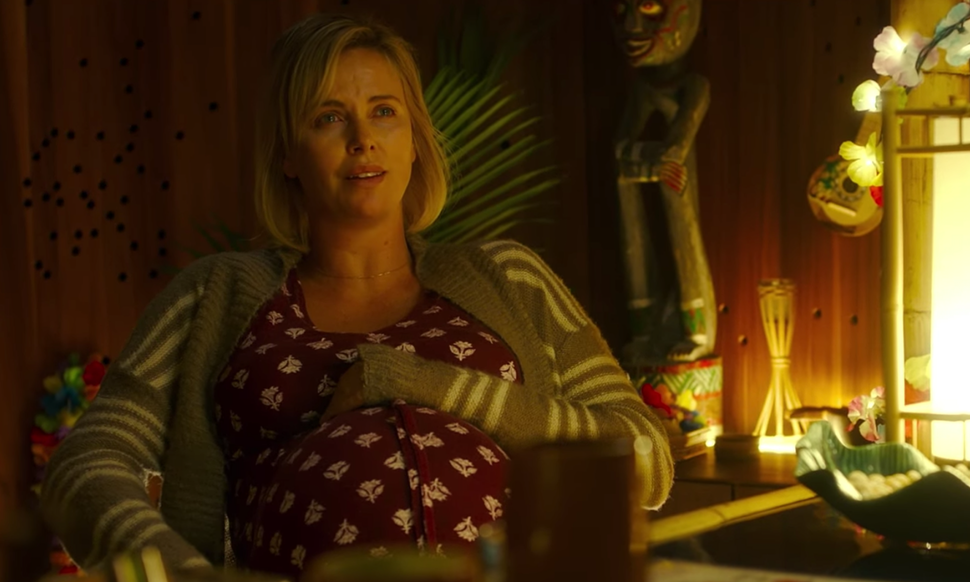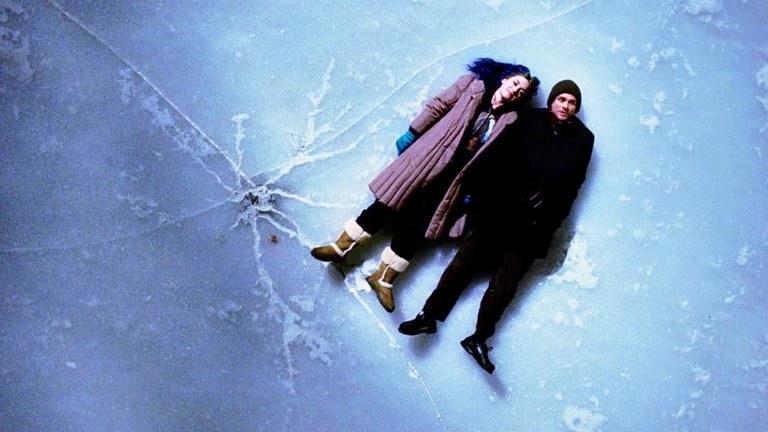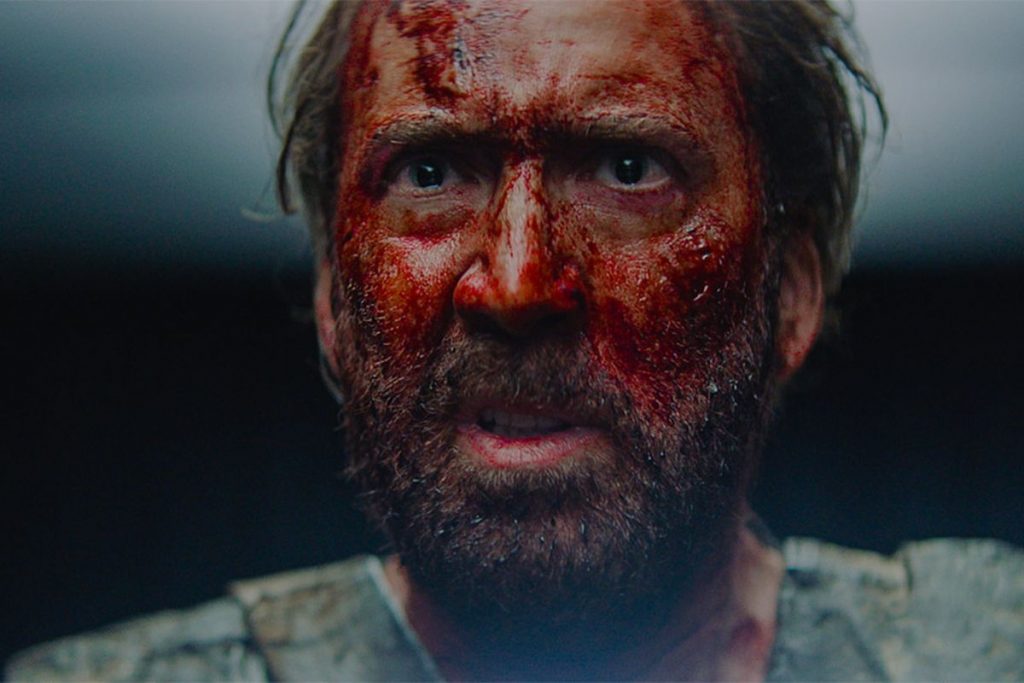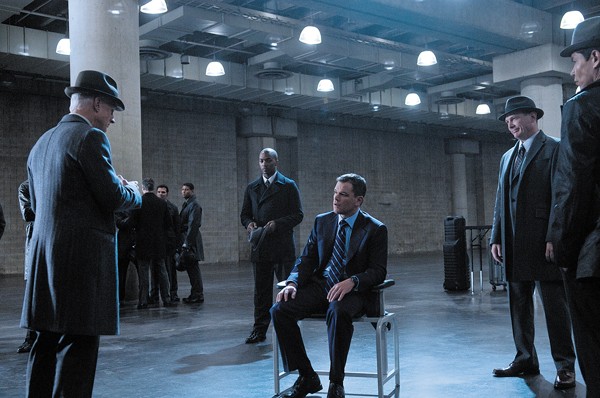Alex writes a piece about movies released 15 years ago masquerading as a Best Of 2018 list.
Best of lists are silly. I have tried to write pieces in the past that point this out, but I stopped them midway because even an anti-best of Best Of is no fun to put together. (For some reason, I never tried simply stating, “Best of lists are silly.”) You say to yourself, “I’ll write about the best cinematic moments of the year instead! Such a creative alternative!” or, “I’ll talk about how I stream all my films on my thermostat’s LED screen now ipso facto, cinema as a concept is meaningless!” or, “Nobody authentically believes I mean these exclamation points!” You begin writing about a particular scene in the Jake Gyllenhaal film Stronger that intrigued you, and you realize that even you are bored. So you stop, assuming you’ll try something like this again next year. And now it’s next year.

The other day, I happened to catch an afternoon screening of Eternal Sunshine of the Spotless Mind for the first time in many years. I knew (and apparently still know) this film like the back of my hand – I could see certain annoying Winslet and Carrey tics coming before they happened, and I predicted the exact moment a favourite Jon Brion music cue was going to come in – and was generally unsurprised by much in the film, because I had long since internalized its important elements. For some reason, be it because I was kind of bored watching a film I already knew so thoroughly or because my coffee happened to hit me in just the right way, a deafeningly bland thought paraded through my brain: “I should write a 2018 best of list.” This thought happened on February 12, and for those readers who fail to grasp simple math, that date occurs over 12% into 2019.
As of this screening, it was now fifteen years (almost to the day) of when I first saw Eternal Sunshine, a film I liked so much in its first theatrical run that I at one point saw the film on three consecutive days. Yet watching it again today remains a pleasurable experience.
Coincidentally, I had already planned to spend that evening watching the 2004 film Collateral for, again, the first time in many years. Like Eternal Sunshine, Collateral was a movie I saw repetitively in cinemas upon its initial release, and semi-constantly once it hit DVD in late 2004. Again, it was a movie I had totally internalized, and again it was a movie I absolutely loved repeating the viewing experience of once more.
In the first week of January 2005, I spent a day watching the five movies I declared my favourites of 2004, with both Collateral and Eternal Sunshine being a part of this makeshift quinfecta. At the time, I was unaware of my own passion for writing nonfiction nonsense, so this marathon was more or less my equivalent of putting together a best of list. If I were to guess, and I’m relatively confident I’m correct, the rest of that 2004 list would be Mean Girls, The Bourne Supremacy, and Harold & Kumar Go to White Castle*.
*I was eighteen. Get off my back.
There are movies from 2018 that I would declare as my favourites of the year, and most of them are films I have the utmost confidence will age well with me. The idea of If Beale Street Could Talk or Roma ever playing as anything but a masterpiece of craftsmanship in 2032 makes no sense to me. But I know better than to declare anything the best, because I don’t exactly get to make the decision. Time takes care of it for us.
If I were to truly pick a favourite film of 2018 (and contrary to that opening paragraph I like to at least try), I think I have to choose Tully. Through a combination of the film being magnificent and my vested interest in Diablo Cody’s work, I think it is my favourite. I watched Tully and loved it, I watched it again and still loved it, then I properly studied it for a podcast and almost nothing I wrote in my notebook was negative. Of movies that I saw in 2018, it is probably the one I clocked the most hours pondering. It makes me laugh and it makes me wonder about my own life, always the most potent cocktail for a film becoming lodged in my memory.
That said, more than most of my favourite films of this decade, I can see a future where my opinion on Tully changes with time. Tully takes some big swings in the direction of a subject I simply have no experience with, and any time you’re addressing things like post-partum depression or any sort of mental health issue, you have a pretty fucking high chance of time proving your thoughts about it questionable. (I can’t imagine Girl, Interrupted looks like a masterpiece twenty years later.) It’s simply a linguistic world where the vernacular is turning too fast for cinema to keep up with for long; wherever we settle eventually, it might be far from the choices Cody makes in Tully.
A BRIEF REPRIEVE TO DISCUSS A LINGUISTIC CHOICE FROM ANOTHER FAVOURITE FROM EARLIER IN THE DECADE
Take, for example, another underseen favourite of mine, 2010’s It’s Kind of a Funny Story. This is a fantastic comedy, and one that feels truly ahead of the curve in the way mental illness is discussed within. (For example, think about how much the way you have talked about mental health has changed in the past nine years; the fact that this movie doesn’t feel as old as Stonehenge is a borderline miracle.)
That said, there is still a moment in the film where Lauren Graham’s young daughter makes a joke using the word “tranny,” and then Lauren Graham repeats that joke to double down on the hilarity. I’m not shaming the movie, as I assume I laughed at this in 2010, but the point is that even when you know how to talk about one serious issue, you can miss completely on how time will treat another. You can be woke AF and still hit the snooze button a couple times.
In the case of Tully, I assume there will come a day when we’ll finally stop using words like “crazy” and “nuts” and “bonkers” and all their assorted variants as pejoratives, and around that day I trust any media product that even tangentially deals with mental health will seem tremendously outdated (not unlike almost every time you see race directly addressed in any way in a film released before 1990). I don’t know when Tully will start to jar me more than make me laugh, but that day may come.
There is one subject broached in Tully I will surely never stop thinking about, however, even if I never experience it in exactly the same manner our lady hero does in the 2018 film. I will never stop thinking about the splitting of the self, because no previous iteration of me has ever stopped thinking about the splitting of the self.
For those who skip the footnotes, I turned eighteen slightly less than halfway through 2004. I have always assumed this played a role in my attachment to certain films from this period, and I remain confident I can’t totally remove myself from the feeling of first seeing these movies when I was eighteen. Is Collateral a good film, viewed as objectively as one can view a piece of art? Of course. Is Eternal Sunshine of the Spotless Mind? Unequivocally. In 2004, did I know they would endure with me as they have? I can’t say.
When I think back about those movies, and how I remember seeing them in 2004, there is one constant: I can remember something external about the experience of seeing each film. I recall walking out into the summer night after a screening of Collateral and realizing the movie’s digital, deep focus exterior shots captured the look of a summer sky better than any movie I had seen previously. Eternal Sunshine is forever attached to those three consecutive days I saw the movie, seeing it three times because the same person failed to show up each time*. The Bourne Supremacy thundered into my life at 5am amidst an overnight movie marathon, and its faux verite stylings had me looking around the theatre for anybody still awake to share this excitement with. Mean Girls became a classic to most over time, but I was an early adopter, seeing that shit seven times in theatres with various collections of pals. Even Harold & Kumar can’t be removed from the experience of seeing it on a Friday night with a group of friends who then decided to cross the goddamn border to buy a bunch of gross, tiny steamed hamburgers.
*My guest for the third screening was a Timbits box filled with chocolate glaze and resignation.
(With the exception of Harold & Kumar, which I have not seen since Dubya’s presidency) I have watched all of these films again in this decade, and have been pleased to see they remain good. They all get watched under pretty much the same circumstances now, usually in the same chair and on the same monitor, as opposed to the same couch and TV I watched the DVDs on in 2004, but they still play well to this crowd of one. Some changes happened, some things remained the same.
The best experience I had at the movies in 2018 was seeing the Panos Cosmatos film Mandy in a full theatre, surrounded by a combination of people who were unsure if they were in for a silly Nic Cage movie, a heavy metal murder opera, or a hypnotic spell masquerading as a film. To these hazel eyes it was the third option and I found it all deeply compelling, including a performance from Cage that was simultaneously absurd and absurdly sad. As the movie ended, the person directly in front of me loudly said, “What the fuck was that?” I was less angry, but equally confused by the experience and certainly moved. Was Mandy truly a great movie? Or did a perfect combination of external forces meld together to raise my experience to an uncommon level? I can’t say, but of 2018’s great films, this will remain the one I am the most afraid to watch again, lest an imperfect second experience even remotely diminish the first.
My attachment to Tully is hardly experiential, although seeing a middle-aged woman literally dance into the theatre as I walked in was rather charming. Other 2018 favourites like Eighth Grade, on the other hand, seem like screenings lodged into my brain as though they happened yesterday.
A BRIEF REPRIEVE TO DESCRIBE AN IMPERFECTLY PERFECT WAY TO WATCH EIGTH GRADE FOR THE FIRST TIME
You have worked up the courage to ask somebody out for a drink. You do so via text message, because it is 2018 and you will not conceivably bump into this person in the wild so this is the way it shall be. You send an inquisitive text message. Twenty minutes later, you turn your phone off because you have not heard back and the movie is supposed to start.
Then you watch a 93-minute movie that is almost exclusively about the experience of feeling ignored when you don’t want to be. Try watching the pool party scene in this exact circumstance and you, too, will find yourself literally tugging the skin of your face to help deal with the different versions of the same awkwardness you and Kayla Day are sharing.
Sitting behind me, because this was again a Saturday night and the theatre was full, were a trio of Kayla-aged girls and one mother. I felt equally bad for the mother when talk of oral sex began; it was clear this woman didn’t totally expect this specific movie. That said, I feel her awkwardness was for the greater good, as I can’t imagine anything but good things (eventually) coming out of a thirteen year old seeing this film.
After the movie, I left the friend I saw the film with and walked a block north, planning to run home on a less busy road. Before I did that, I sat down on a stoop to tie my shoes. I didn’t stand for ten plus minutes, sitting and drinking in the experience I knew would leave me once my heart rate started escalating from activity that was physical as opposed to emotional.
I’ll let you guess whether or not that person ever got back to me.
Sorry to Bother You and The Favourite are movies that were a joy to see because the people around me didn’t quite know what they were getting into. The former is an especially perfect film to see surrounded by hundreds of other people who are working through its bizarre turns and laughs and mutant horses voiced by Forest Whitaker at the same time and speed as you. First Man was a memorable internal experience, one where I couldn’t figure out what I loved about the film until ten minutes into my second time seeing it.
Sorry to Bother You and Eighth Grade and First Man and The Favourite are films I loved, but they were also films I loved seeing. The likeliest scenario involves a film like Something to Bother You falling slightly out of favour with me over time, if only because its wild swings make it the least consistent of the movies I loved in the past year. But those swings also made it memorable, and those swings are what I’ll keep with me as time passes.
Looking over a list of films released in 2004, there are plenty of other films I adored released that year, many of which have effectively fallen out of my brain with time. I may have rewatched them a bunch in 2004 and the following year or two, but at this point it has been a long time since I have consumed them for various reasons. Friday Night Lights was pushed into obsolescence by the television show it inspired, watching Dodgeball was replaced by me actually playing rec league dodgeball, and Napoleon Dynamite became such a cultural sensation that it’s hardly worth watching anymore. Spider-Man 2 was replaced by too many Spider-Men. Sometimes, things just fall out of your life for no particular reason: I’m sure Closer and The Motorcycle Diaries and I Heart Huckabees and Shaun of the Dead are still good films, I simply haven’t had occasion to watch them recently. Movies I once thought were good have been proven terrible (Garden State); movies I once thought were terrible have become favourites (Ocean’s Twelve). Team America: World Police made me laugh so hard I temporarily worried I was going to choke to death on my afternoon Burger King, but like Sorry to Bother You, its highest points were predicated on not being able to anticipate them and it has not had a lot of repeat viewings as a result. Only Before Sunset is a film that I loved in 2004 and might love slightly more now (but basically everything about that movie is an outlier).
The constant, I suppose, is that of all my proper favourites of 2004, I still remain passionate about them in some way. I love Eternal Sunshine for more or less the same reasons I did in 2004, and my appreciation of Collateral as a rad action movie with unique cinematography has evolved into loving it as a movie about the struggle between random chance and fate, but either way the love remains in some form.
When I compare my favourites from other years earlier in this decade, most remain beloved. Inception, Young Adult, The Place Beyond the Pines, The Master, Drinking Buddies, Inherent Vice, The Hateful Eight, etc etc etc have all remained lodged in my heart. Only The Adjustment Bureau has taken a bit of a hit, but I was always kind of aware that would happen; outside of the leads the acting isn’t particularly strong, and even in 2011 I could admit there sure was a lot of stupid shit with magic fedoras. That said, watching it again recently, its ruminations on fate and art and love and politics remained the wheat worth sifting through the magic fedoras filled with chaff.
I suppose my distaste with best of lists likely comes from a place of unsettledness with the idea of film criticism itself. As far back as high school, I began ignoring movie reviews, newspaper and otherwise. Soon into university, I actively began talking shit about conventional movie criticism to uninterested classmates. Too often, such things devolved into “this is good” or “this is bad” without any deeper discussion as to what makes something “good” or what makes something “bad.” To this day, I believe my interests lie too heavily in the business and quality of films because of the way my brain was melded by simplistic, capitalism-driven reviews. Best of lists are almost exclusively surficial; there’s no time to delve in a blurb. I recognize the capitalistic reasons behind all of this, but even now, when you listen to podcasts that quote unquote do a deep dive into the film world, they still barely seem to scratch the surface. There’s so much to know, but so few doing the excavating. There are so many interviews now, and yet they’re all asking the same questions.
That said, I recognize the idea of a best of list helping a cinematic consumer – for people who don’t watch half as many films as I am able to, having a professional curator is important for time management and even I recognize that. Sometimes you can’t write your own cinematic history without an assist from others.
When I watch a movie, I’m watching a collection of mostly unseen people who have put an incredible amount of time into a job. Some people are only on set for a couple of days, or only assisting with organizing footage in the edit suite for a week, but even in those cases the days are often longer than your average job. In the case of writers or directors or stars or producers or editors or cinematographers or production designers or composers or what have you, weeks or months or years or occasionally decades can be spent with an idea ruminating in your head. The eventual film contains all of that, and in the best-case scenario, that film is worth carrying with you for years to come. There is never enough time to talk about all the work that goes into a film, or time to give all of the craftspeople the proper respect they deserve, because all of those craftspeople are working simultaneously in concert and independently to achieve a collective goal. The total amount of hours put into the making of a film is truly absurd. So we’re all blurbing, I suppose, some just have to deal with a more stringent word count.
The reason I keep attempting to write best of lists despite claiming to hate them has to be because I do care. When writing about your favourite movies, what you’re doing is writing about your own personal history, both present and future. You’re writing about these works from a personally historical perspective, and you’re simultaneously writing about yourself today and yourself tomorrow. What you’re saying when you write a best of list isn’t “watch these films cuz they’re lit,” it’s “watch these films because they’re representative of thoughts I didn’t know I had and there are so many people who helped me come to these realizations, so few of whom I can even name and yet they’re all so important to me both now and likely far into the future.” Your own personal history contains artifacts of their professional (and by extension personal) history, whether they know it or not, whether you know their name or not.
Perhaps when there is enough passion directed towards anything, it stays within you forever. You can say goodbye to it, but it’s always going to be there, nagging at you somewhere. You can erase it from your memory, or you can move on with your life, but it will always be there in some way. Marlo moves on from Tully, and yet Tully finds her way back (and might one day do so again). Joel and Clementine erase each other, and yet they remain, playing in the snow of a Montauk beach. The people working on the sets of these films go on to their next show, unaware of how much their work has affected others.
Best of lists are silly. You read them and you think, “Alright well she picked this because she correctly Stans for Daniel Kaluuya and she picked this because she confusingly Stans for Dan Fogelman,” and you become determined to do better yourself before realizing what you’re doing is another version of what everybody else was already doing. You ponder that momentary sense of unity with the artists and writers that feel deeply about cinema, and then you continue on with your life. And then it’s next year.
Film criticism will always inherently tell a partial story. As outlined above, there is no time to get into all the minute details of what makes a film work, and all the people required to do so. Any time you write a review or a Best Of list or an anti-best of Best Of list, you are fighting a losing battle. The only thing that matters is that there’s still something reminding you it’s worth trying.








